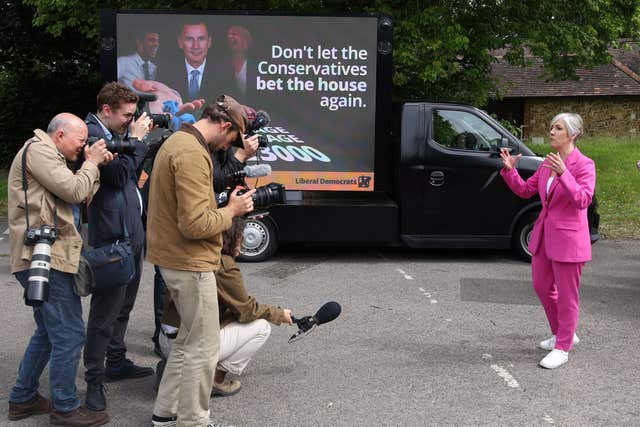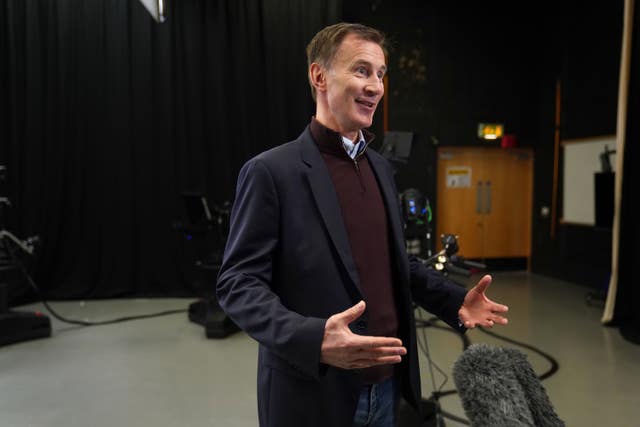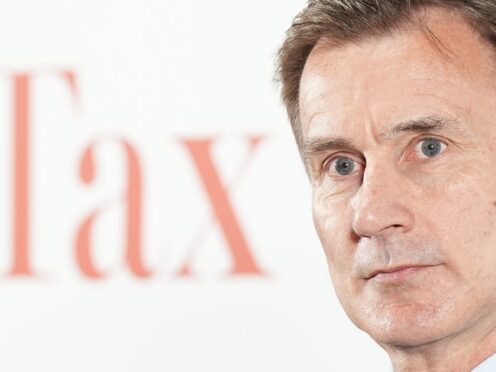Chancellor Jeremy Hunt has said the Conservatives are not pretending that the party winning the General Election is “the most likely outcome” and said his own political future is “too close to call”.
Speaking at the Times CEO Summit, Mr Hunt also said he believed there had not been “sustained economic scarring” from Liz Truss’s mini-budget.
Despite having represented South West Surrey as MP since 2005, the Chancellor is facing significant pressure from the Liberal Democrats in the area’s redrawn constituency of Godalming and Ash.

Nationally the Conservatives are projected to slump to their “lowest seat tally in the party’s almost 200-year history”, with YouGov saying its latest study projects Labour to secure 425 seats, the Tories 108 and the Liberal Democrats 67.
Asked if he could win in his constituency, Mr Hunt told the Times CEO Summit in London: “Genuinely in my seat I think it’s too close to call.
“I have a very middle class electorate in Surrey, very highly educated and actually they have been very mobile voters for all my time in Parliament, so I think it’s very hard to call. I still meet a lot of people who say they haven’t yet made up their mind.
“So I genuinely don’t know the answer to that question. I’ve had the conversation with my kids, I may not be an MP after the election, and that’s OK, that’s democracy, all that sort of stuff.”
Asked if the Conservatives can win the election, he said: “It’s going to be very tough. I don’t think any of us would pretend that is the most likely outcome.
“We can certainly do a lot better than the polls are suggesting and we are working very hard to do so.”
When pressed on what he would do if he loses his job as an MP, Mr Hunt said: “Obviously I’m not expecting to lose, but in that situation I set up and ran my own business for 14 years, but I spent a long time in the private sector and I want to be in public service.
“Whatever way, shape or form that takes, that’s what I like to do.”

Having previously served in a number of cabinet positions including as foreign secretary, Mr Hunt was appointed Chancellor by then-prime minister Ms Truss following the dismissal of Kwasi Kwarteng in the wake of the mini-budget that shocked the UK economy.
The Chancellor, who described his first week in the Exchequer as the “most dramatic” of his life, said it is not “fair” to claim there is “sustained economic scarring” from Ms Truss’s time in No. 10.
He said: “It was one of the – well it was the most – dramatic week in my life in terms of decisions I had to take when I got that rather unexpected call from Liz Truss asking me to be Chancellor.
“Which I thought was a hoax and refused to take the call and could not imagine any situation ever where Liz Truss would actually ask me to be Chancellor, so that was a bit surreal, and then in that first week literally I’m picking the entire mini-budget.
“But I don’t think it’s fair to say that there was a sustained economic scarring from that. I think if you look at us now with lower inflation, higher growth than most major economies we’re actually doing very well.”

On Labour’s proposed economic plans, Mr Hunt said he has “a lot of respect” for shadow chancellor Rachel Reeves, but that the key difference in their approach “boils down to tax”.
He said: “The Labour perspective is that they believe taxation is broadly a force for good, they believe that for social justice reasons, and they are content with tax levels as they are, in fact the Labour manifesto is actually planning to increase taxes by about £8 billion a year.
“If we’re going to bring down taxes, and I’m speaking as the Chancellor who put them up and put them up significantly, it is a lot of hard work. It is a lot of discipline. But I think that is very, very important for our economic future.”
Asked about the possibility of a Labour “supermajority”, Mr Hunt said: “I think one of the challenges if Labour do win is going to be on tax and spend because all the pressure from the Labour Party, the labour movement, the unions is going to be to spend more.
“And in the end, increasing economic growth is a good medium, a long-term way to create more money for public services, but it’s not going to make a difference in the next year or so, and so I think that may well end up, if that happens, with higher taxes.”
He added: “I think there is also a concern that if Labour use that majority to give the vote to 16-year-olds, they could then create a situation in which they have a much larger inbuilt majority for a much longer period of time and I don’t think that’ll be helpful.”
